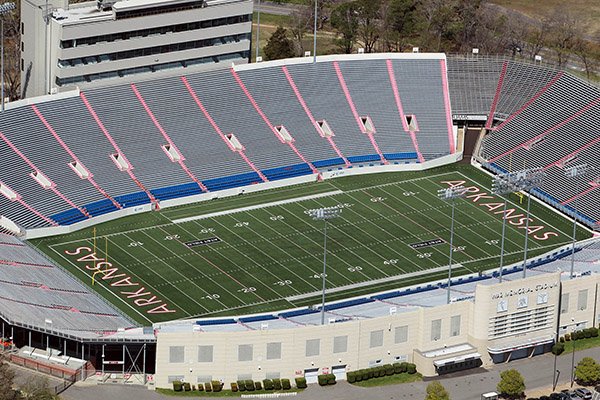LITTLE ROCK — The new contract to play Razorback football games in Little Rock contains blunt messages, one for a specific group of Arkansas fans and one for all involved in the Great Stadium Debate.
To a layman, translation of the legalese is:
—Those who contend games at War Memorial Stadium are a must, put your money where your mouth is.
—The UA wants this experiment to succeed.
The contract for Arkansas to play in Little Rock on Thanksgiving weekend in 2019, 2021 and 2023 says 47,000 tickets must be sold to each game and that sales must exceed $2.1 million the first year, $2.3 million the second year, and $2.5 million the third year.
The agreed upon goals are a reminder that compromise is not a dirty word. Anyway, the stadium seats more than 54,000, so 47,000 should be easily doable, particularly if all fans that railed about the possibility of losing Little Rock games at the end of the 2018 season pony up for a ticket.
The cost will be reasonable — simply dividing 47,000 tickets into the cash goals equals about $45, $49 and $53 per ducat.
Moving on to the UA’s attitude:
—There is every indication that folks in Fayetteville will work to promote the game in Little Rock vs. the previous approach that was more one of indifference than anything.
—Maybe influenced by the horrific weather for the recent Red-White game or the acknowledgement that Arkansas or Missouri - or both - could be having a poor season, the UA has agreed that if ticket sales or revenue fall short of the prescribed objective, both sides have 60 days to identify circumstances that may have impaired the Department of Parks and Tourism’s ability to meet the benchmarks. From there, a plan to meet the goals at remaining games will be developed.
—Assuming the SEC grants a necessary waiver for off-campus scrimmage games, the Razorbacks will play Red-White games in War Memorial in 2020, 2022 and 2024, and there will be a quid pro quo of sorts — the UA will pay $75,000 to scrimmage at War Memorial and the stadium won’t charge for parking at SEC games.
Monetarily, playing in Little Rock makes no sense for the UA. In effect, the athletic department is willing to take a hit of maybe $2 million or so every other year for the sake of statewide unity.
For example, in Little Rock, ticket revenue from the Georgia game in 2014 was $3.2 million and $2.7 million from the Mississippi State game in 2013, while ticket revenue from SEC games in Fayetteville averaged $4 million in 2013, $3.9 million in both 2014 and 2015, and $4.6 million in 2016. With the stadium expansion in Fayetteville, ticket revenue per SEC game is likely to top $5 million this year.
Meanwhile, those who believe the Razorbacks should play only in Fayetteville should note that, for the first time, seven games are scheduled for Donald W. Reynolds Razorback Stadium every other year beginning in 2020.
In fact, during the six years of the contract, the count will be 39 games in Fayetteville, three in Little Rock and three “home” games - six total - in Arlington vs. Texas A&M. By the same token, three SEC games and three scrimmage games in six years at War Memorial is fair for fans south and east of Fayetteville.
Admittedly, the six-game schedule in 2019 in Fayetteville is not attractive with two SEC games, plus Portland State, Colorado State, San Jose State and Western Kentucky. But, the Texas Longhorns dramatically upgrade the non-conference competition in 2021 and athletics director Hunter Yurachek is working to land another big-time opponent for 2023.
The problem is the “home” designation in Arlington occurs the same year as the Missouri game in Little Rock, leaving Arkansas only two SEC games in Fayetteville in odd-numbered years.
It’s no coincidence that the new contract and the agreement to play in Arlington expire the same year.
“They purposefully end concurrently so that we can evaluate both the game in Dallas and the game here (in Little Rock) at the same time and make the best decision for our program at that point in time,” Yurachek said Thursday.

